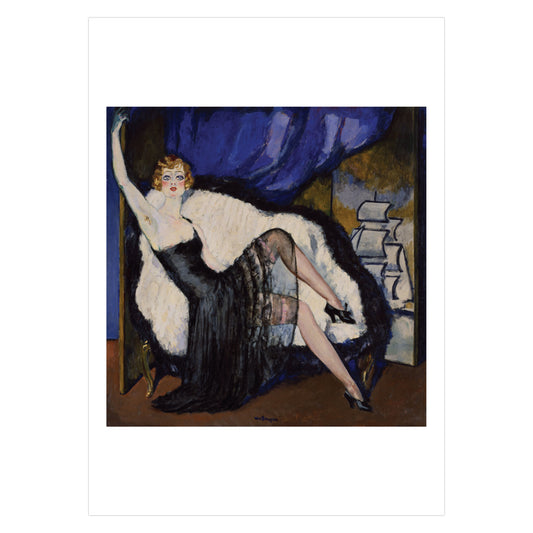Tarjeta postal: "Femme du Monde", de Kees van Dongen
Tarjeta postal: "Femme du Monde", de Kees van Dongen
En existencias
No se pudo cargar la disponibilidad de retiro
Impresas en cartulina resistente con un acabado mate, nuestras tarjetas postales de gran tamaño a todo color son ideales para enviar o crear su propia colección Chrysler.
Kees van Dongen
(Holandés, 1887-1968)
Mujer del mundo, ca. 1929
Óleo sobre lienzo
Museo de Arte Chrysler, Norfolk, Virginia
Donación de Walter P. Chrysler, Jr. 71.714
© 2022 Artists Rights Society (ARS), Nueva York / ADAGP, París
- Requiere franqueo de carta de primera clase para enviar por correo
Product Details
Product Details
- Product type: Postcard
- Shipping Dimensions: 7.0 × 5.0 (17.8 × 12.7 cm)
- Shipping Weight: 0.02 lb (0.3 oz; 8 g)
- SKU: SKU: SKU010008065
- UPC: 2022008
In these collections: Gifts Under $10, Hecho en EE.UU, Kees van Dongen, Museo de Arte Chrysler, Papelería, and Todos los productos.
Share


-
Chrysler Exclusive
Available only from the Chrysler Museum Shop.

About the Artist
Kees van Dongen
The Dutchman Kees van Dongen was, perhaps, the most spirited of the Fauve painters. His heavy, fast-paced life surpassed even the Fauves' exuberant vision of joie de vivre. "I have always played," he once jested. "Painting is nothing but a game." His early art was indeed playful and very chic, a sophisticated blend of boisterous Fauve hues and sensual outline.
After some rudimentary artistic training in Rotterdam, Van Dongen settled in Paris in 1897. His paintings sold poorly at first, and he took a number of colorful odd jobs—wrestler, newspaper vendor, longshoreman—to support himself. His artistic career began in earnest in 1904-05, when he exhibited with the art dealer Ambroise Vollard and at the "Fauve" Salon d'Automne. He soon became the toast of Montmartre, hosting a series of raucous parties for the artistic and social elite of Paris.
After World War I, Van Dongen renounced the hot colors of his earlier works for a chillier palette of steely blues and greens. He maintained his social prominence, and with his many portraits of the rich and famous of Paris—actors, politicians, international society beauties and celebrated women of the evening—he captured all the glitter and glamour of the Folle Epoque, the French Roaring '20s.
Among the most arresting of these portraits is the seductive Mlle Monna Lils, which Van Dongen exhibited in Paris at the 1929 salon of the Société National des Beaux-Arts. In the painting a worldly demimondaine—a heavily rouged "china doll" dressed for dancing—reclines on a couch with predatory abandon, her body set against her fur-lined cape like a costly jewel encased in velvet. "I love everything that shines," Van Dongen once declared, "precious stones that sparkle, fabrics that bristle, beautiful women who inspire carnal desire. And painting gives me the most complete possession of that."
More Kees van Dongen
-
Tarjeta postal: "Femme du Monde", de Kees van Dongen
Precio habitual $1.25 USDPrecio habitualPrecio unitario / por



